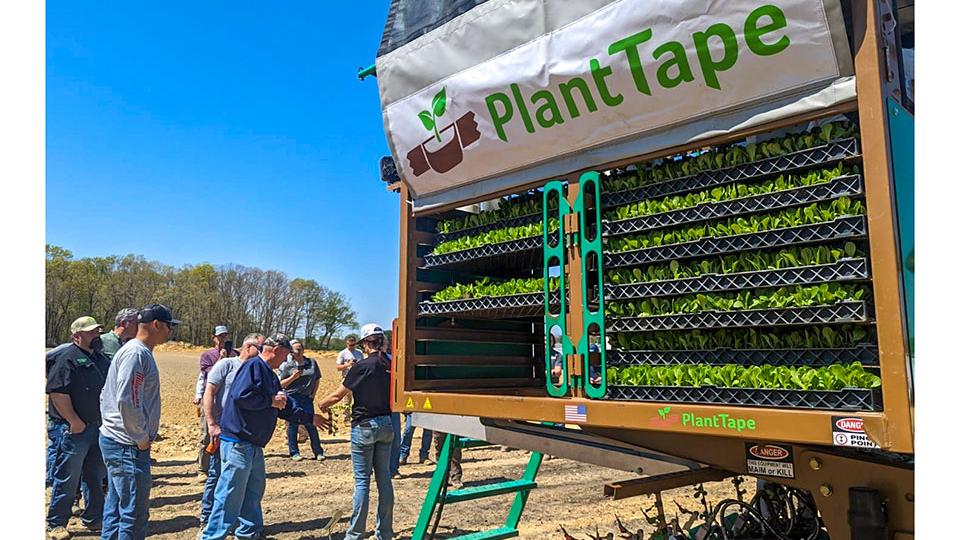Vegetable Growers Gaining Speed to Plant Faster Than They Can Sell It

This farm equipment demonstration in southern New Jersey shows local growers the benefits of PlantTape technology.
Photo courtesy of Tanimura & Antle Fresh Foods Inc.
Jaws dropped. There was wringing of hands and shaking of heads. One observing grower lamented, “We can plant faster and faster, but who’s going to buy it?”
PlantTape brought their demo automated transplanter system to southern New Jersey and growers were amazed and excited, but some were concerned. Host Andy Pagnini said his reaction when he first saw videos of the system was, “This is a game changer!” and immediately reached out to the company.
Most transplanters cannot plant seedlings so young and small, and especially as close together as Pagnini wanted for his leeks. The PlantTape machine can. The biggest challenge faced on his operation in the middle of the City of Vineland was the small size of the fields, which meant the transplanting crew spent more time turning around at the ends of the short rows that barely allowed them to reach half their full speed potential.
That didn’t bother Pagnini. While he might not use it on those small fields on the home farm, those demo rows were tucked in behind his new investment in state-of-the-art greenhouses where he’s growing out the seedlings in the plant tape for himself and other growers.
On the other hand, there is legitimate concern about fewer buyers wanting produce from independent farms typical of the Vineland area. Typically, buyer-shippers in the region would co-mingle produce purchased from multiple farmers each day during the season. A couple dozen of them would compete for each grower’s produce at “the block,” the Vineland Produce Cooperative auction. Growers receive good prices when product is in short supply. Not so good when the crop is heavy.
Now, as seasonal local purchases are a fill-in required to keep a steady flow of product to end buyers year-round, many of those shippers have either purchased farms of their own or entered into partnerships with several growers to create that steady supply, and predictable prices, needed for their markets. That leaves the independent growers in a more precarious position if fewer buyers are bidding on their produce.
What has this to do with marketing? A major part of marketing is knowing production costs and keeping them as low as possible. The PlantTape technology is not inexpensive to get into, but the speed of operation, coupled with only two to three workers doing the job that it would take eight to 10 riding on a traditional transplanter, reduces the cost of transplanting significantly.
In the open market, wholesale commodity business of fresh produce, it will be the low-cost producer who is viable and sustainable.
Not the First Tech to Rock the Industry
Speaking of sustainability, years ago a produce buyer from a major chain spoke to a group of directors of several Garden State cooperatives. He was introducing the new UPC (universal product code) and PLU (price look-up) systems that groceries were adopting to reduce errors at the checkout. Scan a PLU and the right price for the right product comes up automatically.
The only problem was who was going to put that PLU number on packages or pieces of produce? His answer was that if the grower put on a sticker, rubber band, or twist-tie with the codes, they would be compensated. The unspoken understanding was if the grower didn’t take on that task, they wouldn’t be doing business with that buyer for long.
More head shaking and lamenting. Guess which growers are still in business?
A recent USDA press release describes research by the Agricultural Research Service (ARS), with support from USDA Foreign Agricultural Service (FAS). One “sticky problem” U.S. produce exporters face is what the research is trying to solve might be a marketing tool here, too.
Current adhesives used to place PLU stickers on individual produce is not biodegradable, creating fruit and vegetables that cannot be composted even in commercial composting facilities. That produce ends up being landfilled, which leads to production of greenhouse gases.
That’s not acceptable in European markets, so USDA research is working on creating an adhesive that will meet the “home compostable” standard required to export to Europe.
And if it’s exportable to Europe, that’s a sustainable marketing story that will sell in America as well.









